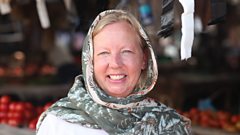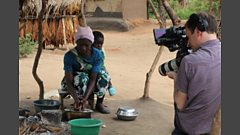
MicroLoan Foundation
Deborah Meaden makes an appeal on behalf of the MicroLoan Foundation, a charity that provides small loans and business training to women in Malawi and Zambia.
Entrepreneur Deborah Meaden ventures out of Dragons' Den to make an appeal on behalf of the MicroLoan Foundation, a charity that helps women in Malawi and Zambia to escape from desperate poverty by providing small loans and business training.
In Malawi, Deborah meets these businesswomen and sees the organisation's work in action. In a country where the majority of people earn less than a pound a day, even modest loans can transform the lives of whole families.
The appeal features the story of Enala Banda, who lives in a remote village in rural Malawi where most people are locked in a cycle of poverty. Her dreams of becoming a teacher were shattered when she had to leave primary school because her family could not afford the fees. Life continued to be a struggle as she grew up and started her own family, and they never had enough food from their land.
Enala recently joined a MicroLoan Foundation group which helped her to set up a small business selling tomatoes and fish. The loan has completely changed her life. She now uses the profits to buy food, send her children to school and save money for the future.
Last on
Clip
-
![]()
Deborah Meaden's Lifeline Appeal for MicroLoan Foundation
Duration: 09:01
Donate to this month's Appeal
To find out more about MicroLoan Foundation please go to:
Or write to: MicroLoan Foundation UK, 1 Canal Court, 152-154 High Street, Brentford, TW8 8JA
Or call: 020 8827 1688
Deborah Meaden

I have spent my lifetime in business and love nothing more than seeing a good idea succeed. I have great belief in the power of business to create opportunity and wealth. But for many people in poorer countries, the chance to run a successful business can actually mean the difference between feeding their children or not, being able to afford medicines or simply having a roof over their heads. In short, an opportunity to run a small business can be lifesaving.
I recently travelled to Malawi in Sub-Sahara with the Microloan Foundation, to discover how some of the poorest women in the world are lifting themselves out of poverty, by doing something close to my own heart, becoming entrepreneurs.
The odds are really stacked against these women – with the majority of the population earning less than a pound a day and living in hard to reach rural areas. The chance of getting a loan to start a business is pretty much impossible. Without the chance to earn a living, these women make the kind of choices that no woman should have to make. Taking their children out of school because they can’t afford uniforms and books. Not being able to give a sick child the medicine they need. Sending their children to bed hungry.
But the Microloan Foundation is changing this. By providing small loans and ongoing business training and support, MicroLoan empowers women in rural Malawi and Zambia to set up self-sustainable businesses. The profits from these businesses enable the women to work themselves and their families out of poverty. As Elana says ‘I can now fend for my family, it gives me hope for the future’.
The charity’s innovative approach is for women to gain strength in numbers. Groups of around 15 women share responsibility for each other’s loans, helping each other through difficult times. MicroLoan provides business training to help them make their businesses successful and they support them for the long term. Helping them to provide a secure future for them and their families.
Each year the MicroLoan makes loans to over 35,000 women, but with over 74% of the Malawian population living in poverty, and 69% of the Zambia population, there are so many more women and families the charity wants to help out of poverty.
Please help support MicroLoan Foundation �鶹�� Lifeline Appeal and help us give hope not handouts to so many more families.
Follow Deborah on Twitter .��
MicroLoan Foundation

MicroLoan Foundation provides an innovative approach to poverty reduction. It solely supports women in rural areas of some of the poorest countries in the world helping them to feed their families, send their children to school and pay for life saving medicines. It is a very different kind of charity, offering hope, not handouts. By providing small loans (average £60) and ongoing business training and support, MicroLoan empowers women in rural Malawi and Zambia to set up self-sustainable businesses that generate vital income to pay for food, education, housing and healthcare for the women and their children. Ultimately, the profits from the businesses enable the women to work themselves and their families out of poverty.
MicroLoan works to change the lives of some of the poorest people on the planet. Malawi and Zambia are two of the poorest countries, with over 74% of the Malawian population living in poverty, and 69% of the Zambia population.
Large proportions of the Malawian and Zambian populations live in rural areas, and depend upon unreliable rain-fed farming to make a living. Access to services such as schooling and health care is often difficult in these areas. There are limited employment and income-generating opportunities. All of these factors mean levels of poverty in rural areas are disproportionately high.
MicroLoan Foundation has been working in Malawi since 2002, and Zambia since 2009 and currently supports over 30,000 women through a network of branches across both countries reaching women in the most difficult to reach rural areas. Through their small businesses, these women are supporting their families and dependants allowing Microloan’s support to multiply and reach thousands more.
Microloan’s model is simple, and highly effective. They provide innovative, on-going business and financial training, mentoring all of the women they work with to ensure the success of the women’s businesses. The loans and training are provided to groups of women. This enables members to draw on collective support to overcome challenges and celebrate successes. Microloan then continues to support these women until they are on their feet and can operate independently of further support, facilitating long-term independence.
Over 50% of the women MicroLoan supports earn less than $1.25 a day (that’s the equivalent of living off 80p a day in the UK). Yet amazingly, 99% of loans are repaid. Once repaid, the money is recycled to make more loans enabling more women to transform their lives. It’s a brilliantly simple, powerful idea: every penny donated to MicroLoan Foundation keeps on giving, over and over again.
Microloan’s vision is to help millions of people help themselves out of poverty by providing them with the opportunity to start small, self-sustainable businesses.
Microloan believes in giving hope, not handouts.
For more information visit Microloan’s website .
Enala

Most people living in rural Malawi are locked in a cycle of poverty. Enala Banda’s family struggled even for the basics.
Enala said, ‘It was a difficult childhood. My parents were subsistence farmers. The lack of money was very severe, they could not support us properly. I dreamed of becoming a teacher. I had to quit primary school because my parents couldn’t afford the fees. I cried that I couldn’t carry on.’
With her parents unable to support her, she had no choice but to get married. And life continued to be a struggle for survival, more so with three small children to look after.
She said, ‘Our house is very small and it leaks when it’s raining’.
And history looked like repeating itself when her children began to miss school because she couldn’t afford books or uniforms.
Enala said, ‘It was a very difficult time. I felt crushed thinking about the problems we faced. We had plans but we had no idea who to turn to for help. I want to leave my children better off than I was.’
Her story is frustratingly commonplace but for Enala - and thousands of other women, MicroLoan offers a way forward. She recently joined a MicroLoan group in her village, and set up a business selling tomatoes and fish. It has completely changed her life.
She said, ‘My life is good now, I am comfortable. I am able to buy things for my household. Now we have food, my children no longer to go to bed on an empty stomach. My children’s education has improved. Now I can afford the things they need to stay in school. I can now fend for my family. It gives me hope for the future.’
Enala’s had a pretty tough start to life, but through the loan that she’s taken out she now has a business, she knows how to make a profit, and she knows how to spend that profit to make sure that she changes the life of her family and that she breaks the chain of poverty.
Abigail

Abigail has been taking microloans for over 10 years and has built up a restaurant business.
Abigail said, ‘When I started I was very poor, even my children were sleeping on a mat without a blanket.’
Over the years, Abigail used the profits she made on her 30 repaid loans to build a busy restaurant employing 3 staff. Finally giving her and her family a secure future.
She said, ‘My life is improving now and I’m helping my family properly.’
10 years ago, Abilgail’s village was a much poorer place. But since then, 80 women have received a loan to start their own businesses, and not only do we now see a thriving village, but these women can now educate, feed, look after their families.
Credits
| Role | Contributor |
|---|---|
| Presenter | Deborah Meaden |
| Executive Producer | Ruth Shurman |
| Series Producer | Alex Steinitz |
| Director | Alex Steinitz |


